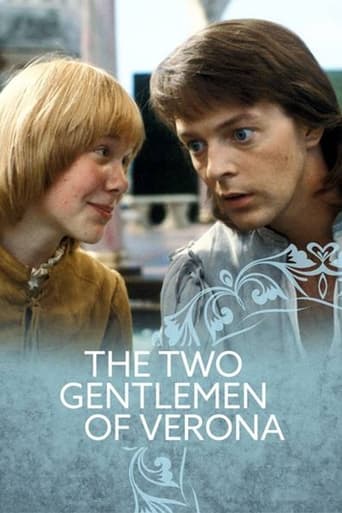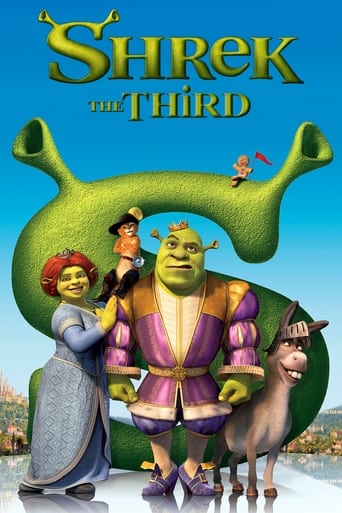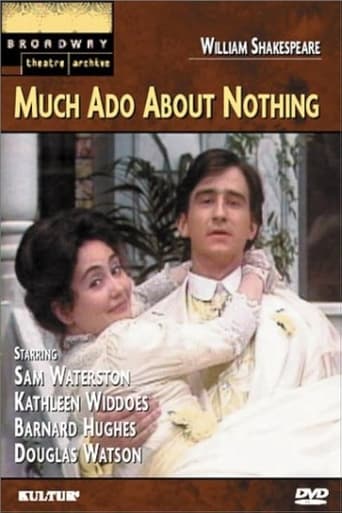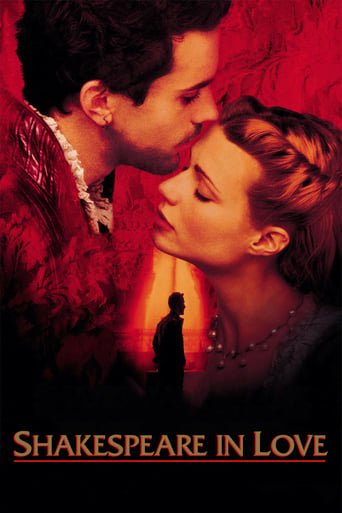

The Two Gentlemen of Verona (1983)
Two great friends leave Verona for Milan, Valentine with great enthusiasm and Proteus unwillingly, as he will have to leave his recently-betrothered Julia. Valentine soon falls in love with Silvia, daughter of the Duke of Milan, but then Proteus meets the captivating Silvia... and he too becomes besotted.
Watch Trailer
Cast


Similar titles
Reviews
The play itself is not one of Shakespeare's better efforts, though I liked it well enough. I am currently taking a class on Shakespearean tragedy and history, so it was nice to break from all of that with such a lightweight piece. There's lots of humor as well as interesting discussion on the nature of love. Unfortunately, the ending comes close to marring everything good about the play. That ending is, as others have noted, awful. How anyone could forgive a "friend" like Proteus, who not only jeopardized his best friend's romantic relationship and job, and abandoned his girlfriend without a moment's pause, but also attempted to sexually assault someone, is beyond me.Nonetheless, this was an enjoyable movie, for all the source material's flaws. All of the actors are charming and funny. They're so wonderful that they almost sell the ridiculous ending. The whole production is stage-bound, especially when we get into the woods, which are deliberately artificial. The musical interludes are beautiful to listen to.Overall, this was a good film version of the material, one that I would certainly give another watch.
Shakespeare here proposes a pure entertainment. Two young men in love with the same woman, and two ladies in love with one of each of these two men. It so happens one man necessarily loves the woman who is the common love to both and the other woman loves the second man. It is then a story of plotting, betraying, cheating, and all variations on these three themes for the one who loves the woman the two men love and is not love by that woman to try to force his choice onto her against the other man who is supposed to be his best friend. The rest is nothing but circumstances. The couple that shares a mutual love will finally come together and the man who lost that woman will accept the love of the other woman. Hence we will end with two happy couples or at least two happily married couples, which is weak in Shakespeare's dramatic patterns. All is well that ends well and it was all much ado about nothing. The play is particularly light because of the numerous musics that take it along on a brisk Elizabethan path. You know something is awry when Launce, Proteus' servant, describes the woman he loves in the style of some official statute. "the catalog of her condition: Imprimis: She can fetch and carry. [ ] Item: She can milk. [ ] Imprimis: She can milk. [ ] Item: She brews good ale. [ ] Item: She can sew. [ ] Item: She can knit. [ ] Item: She can wash and scour. [ ] Item: She can spin. [ ] Item: She has many nameless virtues. [ ] Her vices. Item: She is not to be kissed fasting, in respect of her breath. [ ] Item: She has a sweet mouth. [ ] Item: She doth talk in her sleep. [ ] Item: She is slow in words. [ ] Item: She is proud. [ ] Item: She hath no teeth. [ ] Item: She is curst. [ ] Item: She will often praise her liquor. [ ] Item: She is too liberal. [ ] Item: She hath more hair than wit, and more faults than hairs, and more wealth than faults. [ ] Item: She hath more hair than wit, [ ] and more faults than hairs, [ ] and more wealth than faults. [ ]" Each item is read by Speed and is vastly commented upon by Launce. It is in a way the portrait of a standard woman in Elizabethan society. We have to think of course that in 1590-91 the Queen of England was Elizabeth I and any allusion to the fate of women was an allusion to the Queen who must have had some fair sense of humor to take all the more or less sarcastic remarks on the stage, and at times in the Court since she often invited the companies for court performances, which is by the way alluded too in many plays by Shakespeare who adored having plays in the play and these plays were always in front of kings, dukes or whatever other princes. It is that level we have lost in our reading of Shakespeare and this production is typical of our modernity by having a fair presence of musicians and songs for the sake of entertainment, beauty and tempo, and of course a setting that oscillates between some Italian fantastic château and some dark nightly forest with "the bare scalp of Robin Hood's fat friar" roaming around and a band of runaway castaway outlaws who will be pardoned at the end of the play. We could thus analyze all the allusions to Shakespeare's society and find out that the play and all its poetic charm and humoristic fun is also a slightly satirical and slightly caustic reflection of the society of his time and the history of England, probably to the utmost pleasure of Skakespeare's audience.Dr Jacques COULARDEAU, University Paris 1 Pantheon Sorbonne, University Paris 8 Saint Denis, University Paris 12 Créteil, CEGID
Though most critics fall over backwards to parrot Harold Bloom's characterization of William Shakespeare's The Two Gentlemen of Verona as "the weakest of all Shakespeare's comedies," I found it to be a very entertaining effort, especially as performed by the BBC-Time-Life ensemble in its 1983 performance. Accolades should go to Joanne Pearce as Sylvia, Tessa Peake-Jones as Julia, John Hudson as Valentine, Paul Daneman as the Duke of Milan, and especially to young Nicholas Kaby as the clownish Speed. Cited among Shakespeare's works in 1598 by Francis Meres but not printed until the First Folio of 1623, the most accepted date for the work is the early 1590s but there are no documented performances. Perhaps, for stylistic reasons, it is often thought of as Shakespeare's earliest comedy.Shakespeare commentators consider the story to be taken from a Spanish play by Jorge de Montemayor, Diana Enamorada and it was performed in an anonymous English version at court by the Queen's Men in 1585 as The History of Felix and Philomena. Other influences may have been the commedia dell' arte of the Italian playwright Flaminio Scala. Although the work may not be as weak as some have said, it is generally not well thought of because of the unsavory nature of its characters, particularly the cruel betrayal of Julia by Proteus and the disturbing offer made by Valentine to Proteus in the last act.The play indeed is mystifying unless one looks at it as a fascinating look into the mind and heart of the author whose "two gentlemen" may be (as in Measure for Measure) two sides of his own personality, the trusting, open-hearted and the false-malignant. Like Measure for Measure, it is a self appraisal in which the author does not escape indictment. The story is set in Northern Italy in Verona, Milan, and Mantua and the controversy about its reference to traveling by sea from Verona to Milan and the possibility of shipwrecks has given carte blanche to all those whose goal in life is to prove how little geography Shakespeare actually knew. Although the possibility of shipwrecks does seem rather remote and Shakespeare may have written the play before he was sure of its setting, during the 16th century an extensive canal system did stretch across the Po Valley from Venice, west of Milan, and the Lombard Plain as far as Turin.While some use this play to denigrate Shakespeare, others make the case that the writer showed an astoundingly detailed and accurate knowledge of Italy, demonstrating extensive familiarity with Milanese landmarks such as the Abbey of Saint Ambrose, the Well of St. Gregory, and the Lazaretto. Whether the author visited Italy or not, he makes the audience feel as if everything is coming from rich personal experience. Two Gentlemen is the tale of two friends living in Verona, Valentine and Proteus, whose interests in women lead to complications, none of which are handled very well. Both interestingly enough are known as writers and, when Valentine's lover Sylvia (daughter of a powerful duke) asks him to write poems for her, he discovers that he is writing not for his lover's contentment but for his own satisfaction.Both Valentine and Proteus are sent to Milan, Valentine to gain worldly experience as he asserts, "Home-keeping youth have ever homely wits", and Proteus on a mission from his father. When Proteus arrives, he discovers that Valentine has fallen in love with Sylvia. Turning his back on Julia to whom he had offered undying devotion, he begins to court Sylvia, even while knowing that she loves Valentine and, has been pledged to Thurio by her father. Treachery, plotting, and cruelty abound throughout the play and in the final scene, as Proteus threatens Sylvia who is betrothed to Valentine woo you like a soldier, at arms' And love you 'gainst the nature of love – force ye.As Valentine rushes in to save his lady, Proteus puts his sins behind him:O heaven, were man But constant, he were perfect! That one error Fills him with faults, makes him run through all th' sins.To which Valentine responds incongruously:Then I am paid; And once again do I receive thee honest. And, that my love may appear plain and free, All that was mine in Silvia I give thee.It is an offer that, under the circumstances of a threatened assault, is unfathomable if addressed to another person, but conceivable if addressed to oneself and inaudible to their object. As in Measure for Measure, however, all dishonor is forgiven and the perpetrator, after exposing his faults for all the world to see, is let off the hook with a large measure of unearned compassion. If these events are not the substance of the dramatist's life, they make no sense whatsoever. To paraphrase author Elisabeth Sears, it is clear that in dealing in his plays with the themes that tormented him in real life as a means of exorcising his troubles, Shakespeare was able to transform his anguish into artistic creativity of the highest order.
The Two Gentlemen of Verona is one of Shakespeare's first plays (maybe THE first), and it is rarely seen staged, much less filmed. So this BBC production is a treat and a gem to anyone who strives to familiarize themselves with all of Shakespeare, such as myself.And I must say the production enthused me thoroughly! The set is beautiful, and I am in prostrate awe of these amazing British actors, who can say the most incredible lines, as if these words had no other proper places than on the tongues of these very trophies of the thespian muse. Some scenes were very emotional, and the actors never did flinch an inch, but performed to perfection!The page, Speed, was the best cast member (I wonder how old he was at the time), and I will also single out both Julia and Valentine for da capo performances. Proteus was perhaps a bit oafish, and a bit gay, but he, too, was up to the task and did not disparage the whole. I thought Silvia had a few slightly boring scenes, but 'tis no great matter. The "bit with the dog" (as it is called in Shakespeare In Love), however, didn't contribute a terrible lot to the story, I thought. Launce was a minor character, only thrown in to please the bawdry-craving crowd, but it's possible he would have appealed to me more, had he been presented as more integral to the action - and as rather funnier than he was here.The way the language was spoken and enacted was very lofty. Rather too lofty for a comedy, perhaps. But the good people at BBC knew what they were doing: they were paying homage to Shakespeare's words, and as such felt obliged to focus more on the words than on the theatrics. A more frivolous staging might have been seen by others as less serious and timeless, and might forsooth have been so, if the comedy were not done very well indeed.And as for the story; yes, well, we all agree that it is not Shakespeare's best. Nor his second or third best, and so on. However, is it not a preliminary study to the rest of his works!? Two Gentlemen of Verona practically overflows with thematic references to a dozen or more of the later plays! To wit: We have four lovers running afoul of each other as in A Midsummer Night's Dream. We have a woman disguised as a man, as in several later plays (well, it was a common Elizabethan theme, and would have helped the boy actors to play female parts without having to act like women all the time). We have a band of forest outlaws, almost as the Arden Forest refugees in As You Like It. We have a Friar Laurence like in Romeo and Juliet, and Julia herself is surely an early version of Juliet. We have references to Milan, Mantua and Verona, all of which recur in later plays. I dare suggest that The Two Gentlemen of Verona is not so much a play as a list of ideas for Shakespeare's subsequent comedies, possibly even written down for the express purpose of serving as cues via the which he would remember what to put into his more mature plays years later. Shakespeare was no fluke; he knew what he was doing.To address the pivotal final scene with Proteus' repentance and Valentine's forgiveness; well, Proteus' lines do seem a bit brief to warrant such instant and total forgiveness, but I think the justification for this development should be expressed in the performance, by pausing the words to let the emotion in Proteus' face speak up. Or by arranging the situation and the scenes so that it becomes more clear that Proteus' regret is utterly genuine. This production did not pull this off in a convincing way, but I'm certain it can be done. It may be difficult, but I think it must be possible.But, overall, a GREAT production! What luck that we have the BBC to bestow upon us mere mortals such absolutely impeccably and consummately professionally realized masterworks. My humble thanks.9 out of 10.








